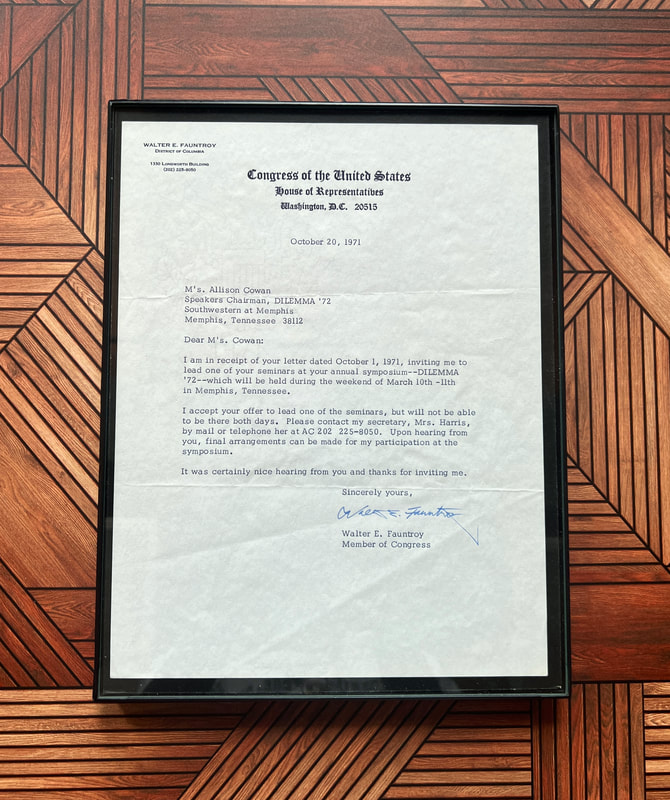CR220
October 20, 1971
Walter Fauntroy letter confirming attendance at conference
Walter Edward Fauntroy (born February 6, 1933) is an American pastor, civil rights activist, and politician who was a delegate to the United States House of Representatives and a candidate for the 1972 and 1976 Democratic presidential nominations as a favorite son.
He graduated second in his class at Washington's all-black Dunbar High School in 1951, and the members of his church held fund-raising dinners to provide him with a college scholarship. When he graduated from Dunbar in 1952, his church gave him enough money to pay for his first year at Virginia Union University in Richmond. He pledged Kappa Alpha Psi fraternity while at Virginia Union, where he graduated with honors in 1955, and then earned a B.Div. from Yale Divinity School in 1958.
During his stay at Virginia Union University, Fauntroy met the 22-year-old Martin Luther King Jr., himself an ordained Baptist minister. With much in common, the two men formed a friendship that began with an all-night discussion of theology. Fauntroy joined the Southern Christian Leadership Conference (SCLC), and upon his return to Washington, D.C., became an influential lobbyist for civil rights in Congress. Fauntroy also helped to coordinate the 1963 March on Washington at which King gave his famous "I Have a Dream" speech.
As director of the Washington Bureau of the Southern Christian Leadership Conference, Fauntroy served as D.C. Coordinator of the historic March on Washington for Jobs and Freedom in 1963, and a coordinator for the 1965 Selma to Montgomery marches and the 1966 March Against Fear. President Lyndon Johnson appointed him Vice Chairman of the White House Conference on Civil Rights in 1966 and Vice Chairman of the D.C. City Council in 1967.
Fauntroy played a key role after the assassination of Martin Luther King Jr., meeting both with President Johnson and with activist Stokely Carmichael during the immediate aftermath. Fauntroy urged people, in person, on TV, and over radio, to adhere to King's policy of nonviolence. He also led a prayer at King's funeral.
Fauntroy also founded and led the Model Inner City Community Organization (MICCO). This organization, which Fauntroy headed until 1971, used federal grants to improve inner city neighborhoods using black architects, city planners, and construction engineers to design and build homes, schools, stores, and other projects in urban Washington. At one time the budget for MICCO was well over $30 million, a community planning and neighborhood development group in Washington, D.C., that established and began to implement the Shaw Urban Renewal Project.
The District of Columbia had no formal representation in Congress before 1970. That year, President Nixon signed the District of Columbia Delegate Act that gave the District one non-voting delegate to Congress. Fauntroy wanted the job. With the support of his fellow pastors in the city – and with appearances by his friend Coretta Scott King — he defeated two primary opponents who had both spent twice as much money as he did. Having won the primary by a substantial margin, Fauntroy easily beat Republican John A. Nevius and other candidates, including future D.C. council members Julius Hobson of the D.C. Statehood Party and Douglas E. Moore, who ran as an independent.
Fauntroy was sworn in March 23, 1971, becoming the first delegate to represent the citizens of the District of Columbia as a member of the United States House of Representatives in almost 100 years. Although Fauntroy's status in the Congress did not allow him to vote on the House floor, he was allowed a vote in committee and could introduce legislation on any issue. Fauntroy therefore became influential with the Congressional Black Caucus (CBC) as a liberal with an agenda that included the concerns of inner city residents, the poor, and minorities. Fauntroy's special quest was for home rule – and eventually statehood – for the District of Columbia. Using his considerable political clout, he oversaw legislation that provided for direct election of a mayor and a city council in Washington by 1973. Fauntroy briefly considered running for mayor of Washington himself but instead decided to stay in Congress. He was returned to his office five times over the ensuing years, sometimes with as much as 85 percent of the vote.
In Congress, he was a founding member of the Congressional Black Caucus. He chaired the Caucus in 1981 and led the organization in presenting, for the first time, a budget to be debated by the House. The "Constructive Alternative Budget" was debated on the House floor for two days. He was a member of the House Banking, Finance and Urban Affairs Committee, Congressman Fauntroy chaired for six years the Subcommittee on Domestic Monetary Policy and for four years chaired the Subcommittee on International Development, Finance, Trade and Monetary Policy. He also chaired, for fifteen years, the Bipartisan/Bicameral Task Force on Haiti.
Fauntroy stepped down from his seat in Congress in 1990 to run for mayor of Washington, D.C.. He was defeated by Sharon Pratt Kelly, finishing in fifth with 7%. He told the Washington Post: "I put together a very careful and thorough plan, but unfortunately that never got over. But I believe that all things work together for the good of those who love the Lord." Indeed, Fauntroy returned to the New Bethel Baptist Church, where he resumed a full-time ministry and rededicated himself to community service.
He graduated second in his class at Washington's all-black Dunbar High School in 1951, and the members of his church held fund-raising dinners to provide him with a college scholarship. When he graduated from Dunbar in 1952, his church gave him enough money to pay for his first year at Virginia Union University in Richmond. He pledged Kappa Alpha Psi fraternity while at Virginia Union, where he graduated with honors in 1955, and then earned a B.Div. from Yale Divinity School in 1958.
During his stay at Virginia Union University, Fauntroy met the 22-year-old Martin Luther King Jr., himself an ordained Baptist minister. With much in common, the two men formed a friendship that began with an all-night discussion of theology. Fauntroy joined the Southern Christian Leadership Conference (SCLC), and upon his return to Washington, D.C., became an influential lobbyist for civil rights in Congress. Fauntroy also helped to coordinate the 1963 March on Washington at which King gave his famous "I Have a Dream" speech.
As director of the Washington Bureau of the Southern Christian Leadership Conference, Fauntroy served as D.C. Coordinator of the historic March on Washington for Jobs and Freedom in 1963, and a coordinator for the 1965 Selma to Montgomery marches and the 1966 March Against Fear. President Lyndon Johnson appointed him Vice Chairman of the White House Conference on Civil Rights in 1966 and Vice Chairman of the D.C. City Council in 1967.
Fauntroy played a key role after the assassination of Martin Luther King Jr., meeting both with President Johnson and with activist Stokely Carmichael during the immediate aftermath. Fauntroy urged people, in person, on TV, and over radio, to adhere to King's policy of nonviolence. He also led a prayer at King's funeral.
Fauntroy also founded and led the Model Inner City Community Organization (MICCO). This organization, which Fauntroy headed until 1971, used federal grants to improve inner city neighborhoods using black architects, city planners, and construction engineers to design and build homes, schools, stores, and other projects in urban Washington. At one time the budget for MICCO was well over $30 million, a community planning and neighborhood development group in Washington, D.C., that established and began to implement the Shaw Urban Renewal Project.
The District of Columbia had no formal representation in Congress before 1970. That year, President Nixon signed the District of Columbia Delegate Act that gave the District one non-voting delegate to Congress. Fauntroy wanted the job. With the support of his fellow pastors in the city – and with appearances by his friend Coretta Scott King — he defeated two primary opponents who had both spent twice as much money as he did. Having won the primary by a substantial margin, Fauntroy easily beat Republican John A. Nevius and other candidates, including future D.C. council members Julius Hobson of the D.C. Statehood Party and Douglas E. Moore, who ran as an independent.
Fauntroy was sworn in March 23, 1971, becoming the first delegate to represent the citizens of the District of Columbia as a member of the United States House of Representatives in almost 100 years. Although Fauntroy's status in the Congress did not allow him to vote on the House floor, he was allowed a vote in committee and could introduce legislation on any issue. Fauntroy therefore became influential with the Congressional Black Caucus (CBC) as a liberal with an agenda that included the concerns of inner city residents, the poor, and minorities. Fauntroy's special quest was for home rule – and eventually statehood – for the District of Columbia. Using his considerable political clout, he oversaw legislation that provided for direct election of a mayor and a city council in Washington by 1973. Fauntroy briefly considered running for mayor of Washington himself but instead decided to stay in Congress. He was returned to his office five times over the ensuing years, sometimes with as much as 85 percent of the vote.
In Congress, he was a founding member of the Congressional Black Caucus. He chaired the Caucus in 1981 and led the organization in presenting, for the first time, a budget to be debated by the House. The "Constructive Alternative Budget" was debated on the House floor for two days. He was a member of the House Banking, Finance and Urban Affairs Committee, Congressman Fauntroy chaired for six years the Subcommittee on Domestic Monetary Policy and for four years chaired the Subcommittee on International Development, Finance, Trade and Monetary Policy. He also chaired, for fifteen years, the Bipartisan/Bicameral Task Force on Haiti.
Fauntroy stepped down from his seat in Congress in 1990 to run for mayor of Washington, D.C.. He was defeated by Sharon Pratt Kelly, finishing in fifth with 7%. He told the Washington Post: "I put together a very careful and thorough plan, but unfortunately that never got over. But I believe that all things work together for the good of those who love the Lord." Indeed, Fauntroy returned to the New Bethel Baptist Church, where he resumed a full-time ministry and rededicated himself to community service.



